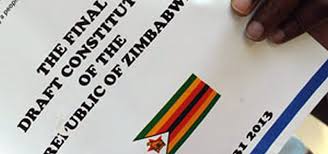
by Collen Chibango
Introduction Constitution of Zimbabwe Amendment (No. 2) Bill gazetted on December 31 2019 proposes a myriad of changes to the Constitution of Zimbabwe Amendment (No. 20) Act, 2013. This has received mixed reactions from many interest groups expressing either displeasure and | or gratitude. This brief aims at providing a simple, non-legal understanding of the proposed constitutional changes, possible implications and opportunities, if any. Overall, the brief posits that the quantum of changes are ill-timed and rushed, thereby leaving a sense of possible “chicanery” and underhand intentions. However, it’s not as bad as some lobbyists will make you believe.
The bad On the negative, the proposed changes allow the president to have powers to appoint judges and the prosecutor-general. These changes, at face value, smack of regression on democratic practice as enshrined in the present constitution and are an attempt to consolidate state capture of the judiciary. This should be avoided at all costs.
Also, the public interviews of judges had little “public” followership and at the end, the President still had the final say.
The good The proposed changes consist of some good proposals, particularly the extension of the quota system and inclusion of youth representation, tying loose ends on devolution implementation and decoupling of delimitation from the census. It is critical, from the outset, to state that there are obviously side effects to all good things and expressions of displeasure by different interest groups cannot be totally ignored. Some proposals, for example, from Women’s Academy for Leadership and Political Empowerment (WALPE), arguing for the complete introduction of 50/50 gender representation, have their merits.
The introduction of the Public Protector can be a good amendment allowing citizens complaint mechanisms and redress against public institutions’ abuse and failure to deliver. The possible conflation with the Zimbabwe Human Rights Commission (ZHRC) mandate must, however, be clearly delineated at law.
Lastly, the removal of possible duplication on devolution is welcome as it can open doors for full and meaningful devolution that has little influence from national institutions. The amendment to remove mayors as automatic chairpersons is at first sight a direct attack at the opposition control of cities, but in reality was defeating the very proportional representation used to come up with provincial and metropolitan councils.
Those in between The brief further posits that the removal of running mates, as is impending in 2023, has no real effect on our democracy. It is a conundrum faced on both sides of the political landscape. It, the running mate idea, is not local and has no real buy-in. It was a law established with issues of succession during the Robert Mugabe era, but might have no real consequence in present-day politics. Rather, it might serve to entrench factionalism ahead of elections which might result in a lot of purging and splits.
- Chamisa under fire over US$120K donation
- Mavhunga puts DeMbare into Chibuku quarterfinals
- Pension funds bet on Cabora Bassa oilfields
- Councils defy govt fire tender directive
Keep Reading
Effectively, the intended end to the law, is well-covered under the sections addressing succession after the demise of the present leader, that is, allowing the ruling political party to nominate replacement within three months. Further, the two-term limit, if not tampered with, has the effect of forcing parties to have a succession plan. The idea of having a directly elected vice-president might not be as democratic as the first thought would make one believe!
The clause allowing the president to appoint seven ministers from outside parliament has both merits and demerits. In a normal, functioning and mature democracy, where technocracy is cherished, this is certainly a welcome move. Our parliament is populated by party zealots, ground operators who have experience in sloganeering and engineering local community coups. It is, therefore, only prudent that the president is allowed to have wider options. The challenge is when the party is supreme to government, conflation of power is rife and there is little room for technocrats to manoeuvre. Such is our crisis!
The proposed changes making the chief secretary to the President and the public service supreme, has little effect on their performance as permanent secretaries are presidential appointees anyway. The question is whether the chief secretary takes over from the Public Service Commission chairman or if both are maintained, how do they relate?
Conclusion The proposed changes would have done better as separated entities to allow for effective and meaningful public input during the public hearings. As a quantum, they serve to confuse the general population as they will be bombardments with piecemeal information aimed at discrediting sections of amendment number 2, but effectively discrediting the whole document.
Recommendations
l Parliament must hold different public hearings for the important parts of the 27 amendments l Political parties must reject unreasonable attempts at amending the Constitution of Zimbabwe l Citizens must participate fully in the public hearing processes.
l Collen Chibango is a senior Research Fellow and Public Policy Analyst at Tutuma Zimbabwe











